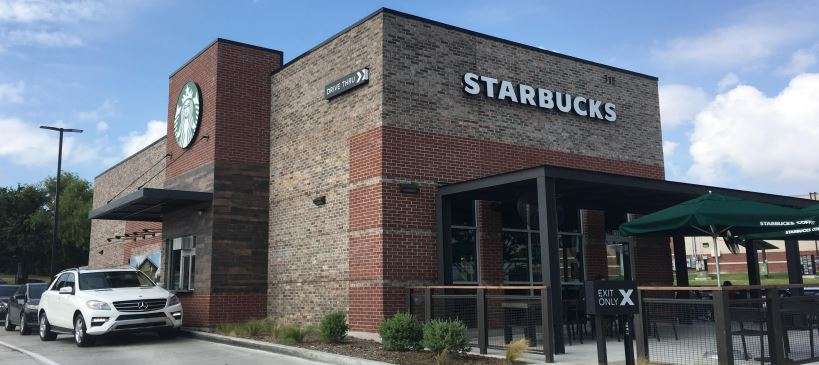
Starbucks NNN Properties for Sale
Are you looking to buy or sell a Starbucks Coffee Ground Lease Property, or NNN Lease Starbucks Coffee Property for passive investment? If you would like to buy or sell Net Lease Starbucks Coffee Properties, please feel free to send us an email to info@nnndeals.com and we will get back to you quickly.

Logo since 2011 |
|
| Type | Public |
|---|---|
|
|
| Industry | Coffee shop |
| Founded | March 30, 1971; 51 years ago (1971-03-30) Pike Place Market, Elliott Bay, Seattle, Washington, U.S. |
| Founders | |
| Headquarters |
Seattle, Washington
,
U.S. |
|
Number of locations |
35,711 (2022) |
|
Area served |
84 countries |
|
Key people |
|
| Products |
|
| Revenue | |
| Total assets | |
| Total equity | |
|
Number of employees |
c. 402,000 (2022) |
| Subsidiaries | |
| Website | www |
Starbucks – The #1 Chain of Coffee Shops Spread in America and Worldwide
Starbucks Corporation is a renowned American coffee organization as well as chain of coffeehouse. Founded in the year 1971, by three partners, it already operated around 23,768 locations throughout the world by November 2016. It is highly regarded as second wave coffee corner, and has managed to maintain its reputation above par in all its coffee serving locations with quality as well as taste.
How it originated?
The company initiated its journey in 1971 with a single store in the historic Pike Place Market in Seattle through the efforts of Jerry Baldwin – an English teacher, Zev Siegl – a history teacher, and Gordon Bowker – a writer. Alfred Peet, a coffee roasting entrepreneur, who also taught them the style of roasting beans, inspired the three to open the coffee chain. As for the name ‘Starbucks’, it clicked the mind of Gordon Bowker after going through the book Moby-Dick, where Starbuck is the chief mate. The three partners unanimously approved the name after considering Pequod and Cargo House as its other names.
In 1981, Howard Schultz entered the Starbucks store for the first time to enjoy the first cup of Sumatra. A year later, he joined the company as the Director of Marketing only to leave it later on after he failed to convince the owners to start a coffee bar, on the lines of successful coffee bars in Italy. Ultimately, the owners decided to sell Starbucks to Schults for $3.8 million in order to focus more on Peet’s Coffee & Tea. It was no looking back for Starbucks from there on. Today it is the #1 coffee shop in America and owns more than 24,000 coffee corners all across the globe. No wonder, it is the world’s foremost roaster and retailer of specialty coffee.
Financial Information
Starbucks (NASDAQ: SBUX) reported total revenue of $21,315,900 or more than $21 million by the fourth quarter of 2016, leading to a settle improvement as compared to total revenue of more than $19 million in the Q4 2015. Likewise, it also excelled in generating the cost of revenue in Q3 2016, which came out to be $8,511,100 in comparison to $7,787,500 in the fourth quarter of 2015. The company earned gross profit of $12,804,800 in the Fiscal 2016, which was yet again much better than its performance in Q4 2015 at $11,375,200. The store sales of Starbucks also rose to 4% globally, with 6% increase in China and 4% in the US. The consolidated net revenue increased 16% to $5.7 billion and its consolidated operating income witnessed steep surge of 27% to $1.2 billion
Market value
Starbucks also owns a strong hold in the share market, which can be inferred by the fact that its shares rose to 252.7% between 2010 and 2016, i.e. from $16.06 on Dec. 31, 2010 to $56.64 on July 12, 2016. Multiple reasons could compel the interested ones to invest in Starbucks. The foremost of them is the Zacks Rank #2 (Buy), together with a favourable growth style score of ‘A’. Mobile transactions and order bookings comprised near about 4% of the total transactions in Q2 2016. Starbucks also enjoyed successful ventures with PepsiCo (PEP). North America Coffee Partnership (NACP) also collaborated with Starbucks to grow into $1.5 billion retail business, which currently offers 40 ready-to-drink beverages. In the China, Asia-Pacific (CAP) region Starbucks yet again expects a steep growth, with an expected increase of its CAP stores to 1000 and threefold rise in CAP revenues to $3billion by 2019. As for rankings, STARBUCKS CORPORATION gained the following:
- #146 in FORTUNE 500 (June 2016) S&P 500
- #119 in FT Global 500 (June 2015)
- #146 in FORTUNE 1000 (June 2016)
Investment prospects
At present, Starbucks operates over 12,700 shops of its own, mostly located in the United States. In addition, its franchisees and licensees have been operating in around 12,375 units across the globe, which include various airports and shopping centers. It has also collaborated with several grocery stores, food service customers to market its coffee. Not surprisingly, owing to all these plus points, Starbucks is currently #1 specialty coffee retailer, with above 25,000 coffee shops spread across 75 countries.
For anyone willing to invest in Starbucks would certainly get much more confidence after going through this detailed financial information about it. However, it would be better to do your own research before making any decision. Still, it is for sure that Starbucks properties or franchises make up for a fruitful prospect to invest in.
